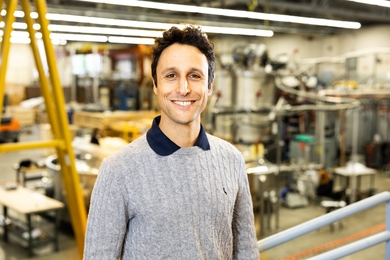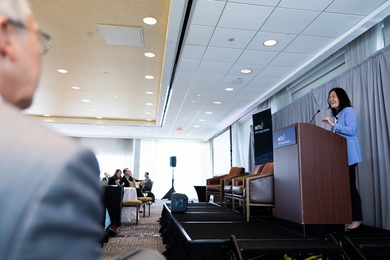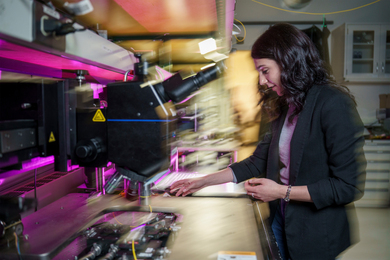The MIT International Science and Technology Initiatives (MISTI) has announced that nine student projects have been awarded funding through its MISTI 2.0 initiative. Students will use the grant money to collaborate with international partners in Germany (4), Mexico (2), Brazil (1), Japan (1) and Spain (1).
Funded projects through MISTI 2.0 include grantees from the School of Architecture + Planning; School of Engineering; School of Humanities, Arts, and Social Sciences; and School of Science. MISTI worked in collaboration with MIT Venture Mentoring Service (VMS) members to select awardees.
“This year’s MISTI 2.0 participants fully meet established high standards for substance and enthusiasm. Further, they are embracing research projects that are more tightly aligned with their careers and passions," said Robert Kiburz SB ‘68, SM ’71, a VMS adviser. "This means they are better prepared for their specific research challenges, and they are more committed to sustaining the value of their efforts. I believe that ‘MISTI 2.0’ is the correct label for this program.”
MISTI 2.0 encourages MISTI alums to take their international experiences to the next level, and deepen their interactions and projects. By integrating their applied knowledge from MISTI training and internships abroad, students can continue fostering global collaborations between faculty, research scientists and peers. In preparation for their MISTI 2.0 project, students participated in a MISTI 2.0 training session on presenting their material to international audiences with Tony Eng, a senior lecturer in the Department of Electrical Engineering and Computer Science.
MIT’s largest international program, MISTI is a pioneer in applied international studies. Since 1994, the program has placed more than 4,000 MIT students in professional internships and research positions with its network of leading companies, universities, research institutes and NGOs around the world. MISTI currently operates 12 programs: Brazil, Chile, China, France, Germany, India, Israel, Italy, Japan, MISTI MIT-MEET, Mexico and Spain. The program is a part of the Center for International Studies.
2011-2012 grantees:
The Contemporary IBA: Innovative Regeneration Strategies, Germany
Alice Shay, city planning
Configuration of FGPA communication in a flight simulator, Mexico
Ioana Zelko, physics and electrical engineering
New functional polymers for organic solar cells, Japan
Jose Lobez, chemistry
The Pacification Police as Laboratory for Police Reform in Rio de Janeiro, Brazil
Julia Tierney, urban planning
Analysis of microearthquake locations from two different methods, Germany
Maria Gabriela Melo Silva, geophysics
AFM-Based Imaging of Collagen Fibrils, Germany
Michael Batista, materials science and biological engineering
Producing Thermally Conductive Polymer Using Graphite Filler, Germany
Nikita Khlystov, chemical and biological engineering
Study of murals at the archaeological sites of Palenque and Toniná: Implications for the origin and manufacture of the materials used for the pigments and lime bases, Mexico
Shannon Taylor, archaeology and materials science
Modeling the Electric Grid with a Spanish Model, Spain
Xiang Ling Yap, Technology and Policy Program; Engineering Systems Division
Funded projects through MISTI 2.0 include grantees from the School of Architecture + Planning; School of Engineering; School of Humanities, Arts, and Social Sciences; and School of Science. MISTI worked in collaboration with MIT Venture Mentoring Service (VMS) members to select awardees.
“This year’s MISTI 2.0 participants fully meet established high standards for substance and enthusiasm. Further, they are embracing research projects that are more tightly aligned with their careers and passions," said Robert Kiburz SB ‘68, SM ’71, a VMS adviser. "This means they are better prepared for their specific research challenges, and they are more committed to sustaining the value of their efforts. I believe that ‘MISTI 2.0’ is the correct label for this program.”
MISTI 2.0 encourages MISTI alums to take their international experiences to the next level, and deepen their interactions and projects. By integrating their applied knowledge from MISTI training and internships abroad, students can continue fostering global collaborations between faculty, research scientists and peers. In preparation for their MISTI 2.0 project, students participated in a MISTI 2.0 training session on presenting their material to international audiences with Tony Eng, a senior lecturer in the Department of Electrical Engineering and Computer Science.
MIT’s largest international program, MISTI is a pioneer in applied international studies. Since 1994, the program has placed more than 4,000 MIT students in professional internships and research positions with its network of leading companies, universities, research institutes and NGOs around the world. MISTI currently operates 12 programs: Brazil, Chile, China, France, Germany, India, Israel, Italy, Japan, MISTI MIT-MEET, Mexico and Spain. The program is a part of the Center for International Studies.
2011-2012 grantees:
The Contemporary IBA: Innovative Regeneration Strategies, Germany
Alice Shay, city planning
Configuration of FGPA communication in a flight simulator, Mexico
Ioana Zelko, physics and electrical engineering
New functional polymers for organic solar cells, Japan
Jose Lobez, chemistry
The Pacification Police as Laboratory for Police Reform in Rio de Janeiro, Brazil
Julia Tierney, urban planning
Analysis of microearthquake locations from two different methods, Germany
Maria Gabriela Melo Silva, geophysics
AFM-Based Imaging of Collagen Fibrils, Germany
Michael Batista, materials science and biological engineering
Producing Thermally Conductive Polymer Using Graphite Filler, Germany
Nikita Khlystov, chemical and biological engineering
Study of murals at the archaeological sites of Palenque and Toniná: Implications for the origin and manufacture of the materials used for the pigments and lime bases, Mexico
Shannon Taylor, archaeology and materials science
Modeling the Electric Grid with a Spanish Model, Spain
Xiang Ling Yap, Technology and Policy Program; Engineering Systems Division






